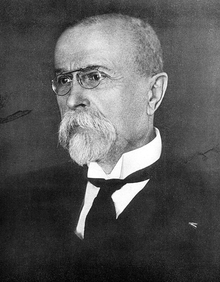Thomas G. Masaryk
| Tomáš Garrigue Masaryk | |
|---|---|
 |
|
| 1st President of Czechoslovakia | |
|
In office 14 November 1918 – 14 December 1935 |
|
| Preceded by | Position established |
| Succeeded by | Edvard Beneš |
| Personal details | |
| Born |
7 March 1850 Hodonín , Austrian Empire (now Czech Republic |
| Died | 14 September 1937 (aged 87) Lány, Czechoslovakia (now Czech Republic)) |
| Political party |
Young Czech Party (1890–1893) Realist Party (1900–1918) |
| Spouse(s) | Charlotte Garrigue |
| Children |
Alice (1879–1966) Herbert (1880–1915) Jan (1886–1948) Olga (1891–1978) |
| Alma mater | University of Vienna |
| Profession | Philosopher |
| Religion | Evangelical Church of Czech Brethren |
| Signature | |
Tomáš Garrigue Masaryk (Czech: [ˈtomaːʃ ˈɡarɪk ˈmasarɪk]), sometimes called Thomas Masaryk in English (7 March 1850 – 14 September 1937), was a Czech politician, sociologist and philosopher, who as an eager advocate of Czechoslovak independence during World War I became the founder and first President of Czechoslovakia, and thus referred to as "President liberator". He originally wished to reform the Austro-Hungarian monarchy into a democratic federal state, but during the First World War he began to favour the abolition of the monarchy and, with the help of the Allied Powers, eventually succeeded.
Masaryk was born to a poor working-class family in the predominantly Catholic city of Hodonín, Moravia (in the region of Moravian Slovakia, today in the Czech Republic). Another tradition claims the nearby Slovak village of Kopčany, the home of his father, as his birthplace. He subsequently grew up in the village of Čejkovice, in South Moravia, later moving to Brno to study.
His father Jozef Masárik, born in Kopčany in Slovakia (then the Hungarian part of Austria-Hungary), was a carter and later the steward and coachman at the Imperial Estate of near-by Hodonín. Tomáš's mother Teresie Masaryková (née Kropáčková) was a Moravian of Slavic origin but with German education. She worked as a cook at the Estate where she met Jozef Masárik and they married on 15 August 1849.
...
Wikipedia
